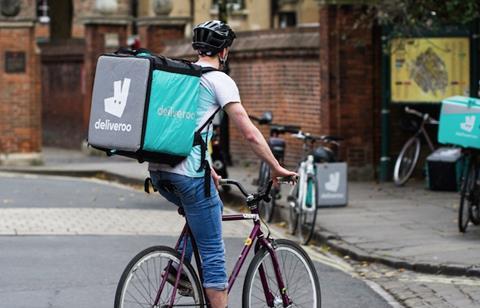
Food delivery organisation Deliveroo has paid compensation to 50 of its couriers to settle legal action regarding whether they should be classified as workers or self-employed independent contractors, and whether riders can therefore access employment rights, such as the national minimum wage and holiday pay.
The legal action, which was brought by law firm Leigh Day, argued that couriers working for Deliveroo are workers rather than independent, self-employed contractors. As workers, the couriers would be entitled to employment rights that self-employed contractors do not have access to, such as the right to be paid the national minimum wage and the right to receive holiday pay.
According to Leigh Day, Deliveroo stipulated that riders had to be available to work at least two weekend shifts each week and that they had to wear Deliveroo’s uniform while completing shifts. Poor attendance was disciplined using warnings or dismissals and Deliveroo reportedly reduced couriers’ shifts as a punishment for poor attendance or performance.
Deliveroo monitors its riders and produces weekly performance statistics, with performance management led by line managers through one-to-one meetings. These could include formal warnings suggesting that, if riders did not improve, their contracts would be terminated. Managers also told couriers that they could not arrange cover for their shifts without first obtaining permission from Deliveroo.
In November 2017, The Central Arbitration Committee (CAC) ruled that Deliveroo riders are self-employed and are not entitled to be represented by a trade union, receive holiday pay or be paid the national minimum wage. However, earlier this month, the High Court overturned a previous decision, ruling that trade union Independent Workers’ Union of Great Britain (IWGB) could proceed with its collective bargaining case against the organisation.
Annie Powell, solicitor in the employment department at Leigh Day, said: “Deliveroo has paid out a material sum to settle these claims. In our view, this shows that Deliveroo knew that they were very likely to lose at the Employment Tribunal.
“This settlement will make a real difference to our clients’ lives. Some of the riders we represented were on the bread line, earning hundreds and in some cases thousands of pounds below the national minimum wage over the time that they worked for Deliveroo.
“However, there are thousands of other Deliveroo riders who have not yet received any compensation for Deliveroo’s refusal to provide basic employment rights. We are calling on Deliveroo to change their practices now, to ensure that riders are paid at least the minimum wage and receive holiday pay.
“We also believe that Deliveroo should implement a compensation scheme for all riders who worked under the contract in question in this case, and all previous contracts. This scheme should compensate riders for Deliveroo’s failure to pay the national minimum wage as well as paid holiday. If Deliveroo fails to compensate riders voluntarily, then current and former riders can bring further claims.
“We hope that the current Parliamentary inquiry into Deliveroo’s practices will consider such a compensation scheme as well as the experiences of the riders who brought this claim.”
Deliveroo was unavailable for comment at the time of publication.











